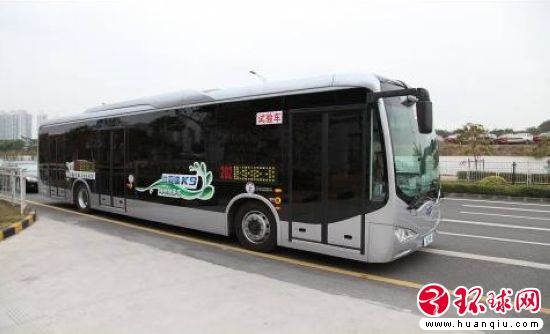Hong Kong (CNS) -- Biyadi Automobile Company (BYD) is targeting the new energy market in the Hong Kong Special Administrative Region (HKSAR) and planning to promote its electric powered buses by the end of this year, Lin Mi, spokesman and senior market manager at BYD, told CNS Monday.
Founded in July, the BYD Hong Kong Research and Development Center has already been put into operation with a group of six engineers, in cooperation with its existing development team. The electric powered buses will be put on the market this November, followed by another right-hand drive electric taxi in the coming summer, said Lin.
According to Hong Kong's Financial Secretary, John Tsang Chun-wah, on September 4, BYD intends to rent a BYD K9 bus to the Kowloon Motor Bus for a trial period of six months, on the line from Tsim Sha Tsui to Kwai Fong.
Integrating resources from both Shenzhen and Hong Kong, the bus will use parts produced in Hong Kong, including a vehicle security and passenger information service system, a wireless backing up monitoring system for long-body vehicles, and a tire pressure report system.
On their choice of Hong Kong as the development base, Lin explained that the right-hand drive market takes up about 20% to 30% of shares all over the world, and Hong Kong is the closest right-hand drive market from Shenzhen, which allows BYD to conveniently test its competitiveness in the unexplored field.
On the development resource side, the fully-internationalized Hong Kong market is supplied with sufficient talent resources with a comprehensive coverage over right-hand steering, batteries, and new techniques such as man-machine interaction, which Shenzhen, home to only one university, is unlikely to rival.
In Lin's view, Hong Kong has an environment motivating huge creativeness and efficient access from the research base to the market, which will be beneficial to the company's future exploration in the field of advanced technology.
"There is no better electrocar market than Hong Kong." First, it is the best experiment spot, where cars run only within a certain area; second, power cost at the mainland level prevailed over the internationalized oil price; third, high dependence on public transportation makes it a perfect practice ground to test a 100% electric powered bus; fourth, serious pollution creates an advantage for new energy applications; and last but not least, the prosperous local economy provides huge potential for a successful case to internationalize itself.
"At this crucial moment," said Lin, "as some call it 'the fourth industrial revolution', if China were to seize the opportunity, it would bring about scores of international brands and introduce Chinese domestic names abroad. This is also a golden chance for Hong Kong."
Meanwhile, he pointed out that the new energy policies in Hong Kong have fallen far behind those on the mainland. For example, an electrocar at the price of 300,000 yuan is subsidized for both 60,000 yuan by the central government and another same amount by the Shenzhen local government, which makes the final deal only 180,000 yuan.
China is at the lead of global new energy development. On the contrary, Hong Kong fails to fully realize its new energy policies. Despite this, Lin still believes in the bright future of electrocars in Hong Kong, with more prospective policy support and encouragement from the SAR administration.



















